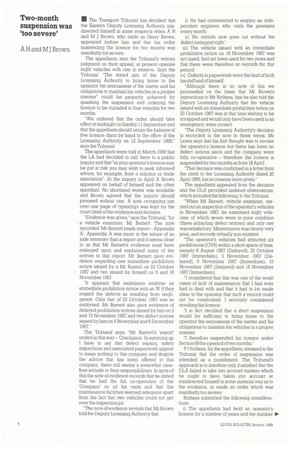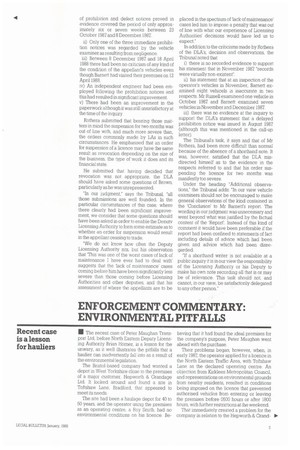Two-month suspension was 'too severe'
Page 90

Page 91

If you've noticed an error in this article please click here to report it so we can fix it.
A H and M J Brown
111 The Transport Tribunal has decided that the Eastern Deputy Licensing Authority misdirected himself in some respects when A H and M J Brown, who trade as Harry Brown, appeared before him and that his order suspending the licence for two months was manifestly too severe.
The appellants, says the Tribunal's written judgment on their appeal, at present operate eight vehicles with one in reserve. Says the Tribunal: "The stated aim of the Deputy Licensing Authority to bring home to the operator the seriousness of the matter and his obligations to maintain his vehicles in a proper manner" could be properly achieved by quashing the suspension and ordering the licence to be curtailed to four vehicles for two months.
"We ordered that the order should take effect at midnight on Sunday 11 September and that the appellants should return the balance of five licence discs by hand to the office of the Licensing Authority on 12 September 1988," says the Tribunal.
The appellants were told in March 1988 that the LA had decided to call them to a public inquiry and that "as your operator's licence may be put at risk you may wish to seek informed advice, for example, from a solicitor or trade association". At the inquiry in April A Brown appeared on behalf of himself and the other appellant. No shorthand writer was available and Brown agreed that the inquiry should proceed without one. A note occupying just over one page of typescript was kept by the court clerk of the evidence and decision.
"Evidence was given," says the Tribunal, "by a vehicle examiner, Mr Barnett. The note recorded 'Mr Barnett reads report Appendix A. Appendix A was more in the nature of an aide memoire than a report and it seems clear to us that Mr Barnett's evidence must have enlarged upon and explained many of the entries in that report. Mr Barnett gave evidence regarding one immediate prohibition notice issued by a Mr Russell on 23 October 1987 and two issued by himself on 9 and 18 November 1987.
"It appears that examiners endorse an immediate prohibition notice with an if they regard the defects as resulting from negligence, Only that of 23 October 1987 was so endorsed. Mr Barnett also gave evidence of delayed prohibition notices issued by him on 3 and 10 November 1987 and two defect notices issued by him on 4 November and 8 December 1987."
The Tribunal says: "Mr Barnett's 'report' ended in this way 'Conclusion. In summing up I have to say that defect repairs, safety inspections and associated paperwork appear to mean nothing to this company and despite the advice that has been offered to this company, there still seems a somewhat carefree attitude to their responsibilities. In spite of this the note of evidence records that he stated that he had the full co-operation of the 'Company' on all his visits and that the maintenance facilities seemed adequate apart from the fact that two vehicles could not get over the inspection pit.
"The note of evidence reveals that Mr Brown told the Deputy Licensing Authority that i) He had commenced to employ an independent engineer who visits the premises every month: ii) 'No vehicle now goes out without the defect being put right.'
in) The vehicle issued with an immediate prohibition notice on 18 November 1987 was not taxed, had not been used for two years and that there were therefore no records for that period: iv) Defects in paperwork were the fault of both his staff and of himself.
"Although there is no note of this we proceeded on the basis that Mr Brown's instructions to Mr Rothera, that he also told the Deputy Licensing Authority that the vehicle issued with an immediate prohibition notice on 23 October 1987 was at that time waiting to be scrapped and would only have been used in an emergency, were correct.
The Deputy Licensing Authority's decision is recorded in the note in these terms. Mr Lewis says that his first thought was to revoke the operator's licence but there has been no defect notices since and the company were fully co-operative therefore the licence is suspended for two months as from 18 April'.
"That decision was confirmed in a letter from the clerk to the Licensing Authority dated 20 April 1988, but no reasons were given."
The appellants appealed from the decision and the DLA provided undated observations, which included the following; to the Tribunal: "When Mr Barnett, vehicle examiner, carried out an inspection of the operator's vehicles in November 1987, he examined eight vehicles, of which seven were in poor condition (three attracting defect notices) and only one was satisfactory. Maintenance was clearly very poor, and records virtually non-existent.
"The operator's vehicles had attracted six prohibitions (GV9) within a short space of time, namely 6 August 1987 (Delayed), 23 October 1987 (Immediate), 3 November 1987 (Delayed), 9 November 1987 (Immediate), 10 November 1987 (Delayed) and 18 November 1987 (Immediate).
"I considered that this was one of the worst cases of lack of maintenance that I had ever had to deal with and that it had to be made clear to the operator that such a record could not be overlooked I seriously considered revoking his licence.
"I in fact decided that a short suspension would be sufficient to bring home to the operator the seriousness of the matter and his obligations to maintain his vehicles in a proper manner.
"I therefore suspended his licence under Section 69 for a period of two months" P1 Rothera, for the appellants, stressed to the Tribunal that the order of suspension was intended as a punishment. The Tribunal's approach is to interfere only if satisfied that the DLA failed to take into account matters which he ought to have taken into account or misdirected himself in some material way as to the evidence, or made an order which was manifestly too severe.
Rothera submitted the following considerations: i) The appellants had held an operator's licence for a number of years and the number IP. of prohibition and defect notices proved in evidence covered the period of only approximately six or seven weeks between 23 October 1987 and 8 December 1987.
ii) Only one of the three immediate prohibition notices was regarded by the vehicle examiner as resulting from negligence.
iii) Between 8 December 1987 and 18 April 1988 there had been no criticism of any kind of the condition of the appellant's vehicles even though Barnett had visited their premises on 12 April 1988.
iv) An independent engineer had been employed following the prohibition notices and this had resulted in significant improvement.
v) There had been an improvement in the paperwork although it was still unsatisfactory at the time of the inquiry.
Rothera submitted that bearing those matters in mind the suspension for two months was out of line with, and much more severe than, the orders commonly made by LAs in such circumstances. He emphasised that an order for suspension of a licence may have the same result as revocation depending on the size of the business, the type of work it does and its financial state.
He submitted that having decided that revocation was not appropriate, the DLA should have asked some questions of Brown particularly as he was unrepresented.
"In our judgment" says the Tribunal, "all those submissions are well founded. In the particular circumstances of this case, where there clearly had been significant improvement, we consider that some questions should have been asked in order to enable the Deputy Licensing Authority to form some estimate as to whether an order for suspension would result in the appellant ceasing to trade.
'We do not know how often the Deputy Licensing Authority sits, but his observation that 'This was one of the worst cases of lack of maintenance I have ever had to deal with' suggests that the 'lack of maintenance' cases coming before him have been significantly less severe than those coming before Licensing Authorities and other deputies, and that his assessment of where the appellants are to be placed in the spectrum of lack of maintenance' cases led him to impose a penalty that was out of line with what our experience of Licensing Authorities' decisions would have led us to expect."
In addition to the criticisms made by Rothera of the DLA's, decision and observations, the Tribunal noted that i) there is no recorded evidence to support his statement that in November 1987 "records were virtually non-existent".
ii) his statement that at an inspection of the operator's vehicles in November, Barnett examined eight vehicels is inaccurate in two respects. Mr Russell examineed one vehicle in October 1987 and Barnett examined seven vehicles in November and December 1987.
iii) there was no evidence at the inquiry to support the DLA's statement that a delayed prohibition notice was issued in August 1987 (although this was mentioned in the call-up letter).
The Tribunal's task, it says and that of Mr Rothera, had been more difficult than normal because of the absence of a shorthand note. It was, however, satisfied that the DLA misdirected himself as to the evidence in the respects referred to and that his order suspending the licence for two months was manifestly too severe.
Under the heading "Additional observations," the Tribunal adds: "In our view vehicle examiners should not be encouraged to make general observations of the kind contained in the 'Conclusion' to Mr Barnett's report. The wording in our judgment was unnecessary and went beyond what was justified by the factual content of the 'Report'. Instead of this kind of comment it would have been preferable if the report had been confined to statements of fact including details of advice which had been given and advice which had been disregarded, 'If a shorthand writer is not available at a public inquiry it is in our view the responsibility of the Licensing Authority or his Deputy to make his own note recording all that is or may be of relevance. This task should not and cannot, in our view, be satisfactorily delegated to any other person."
































































































